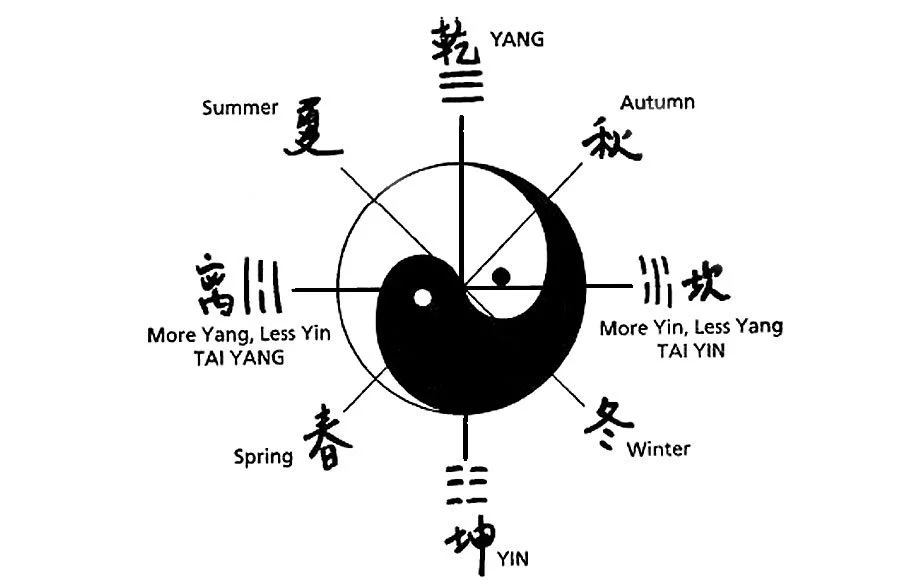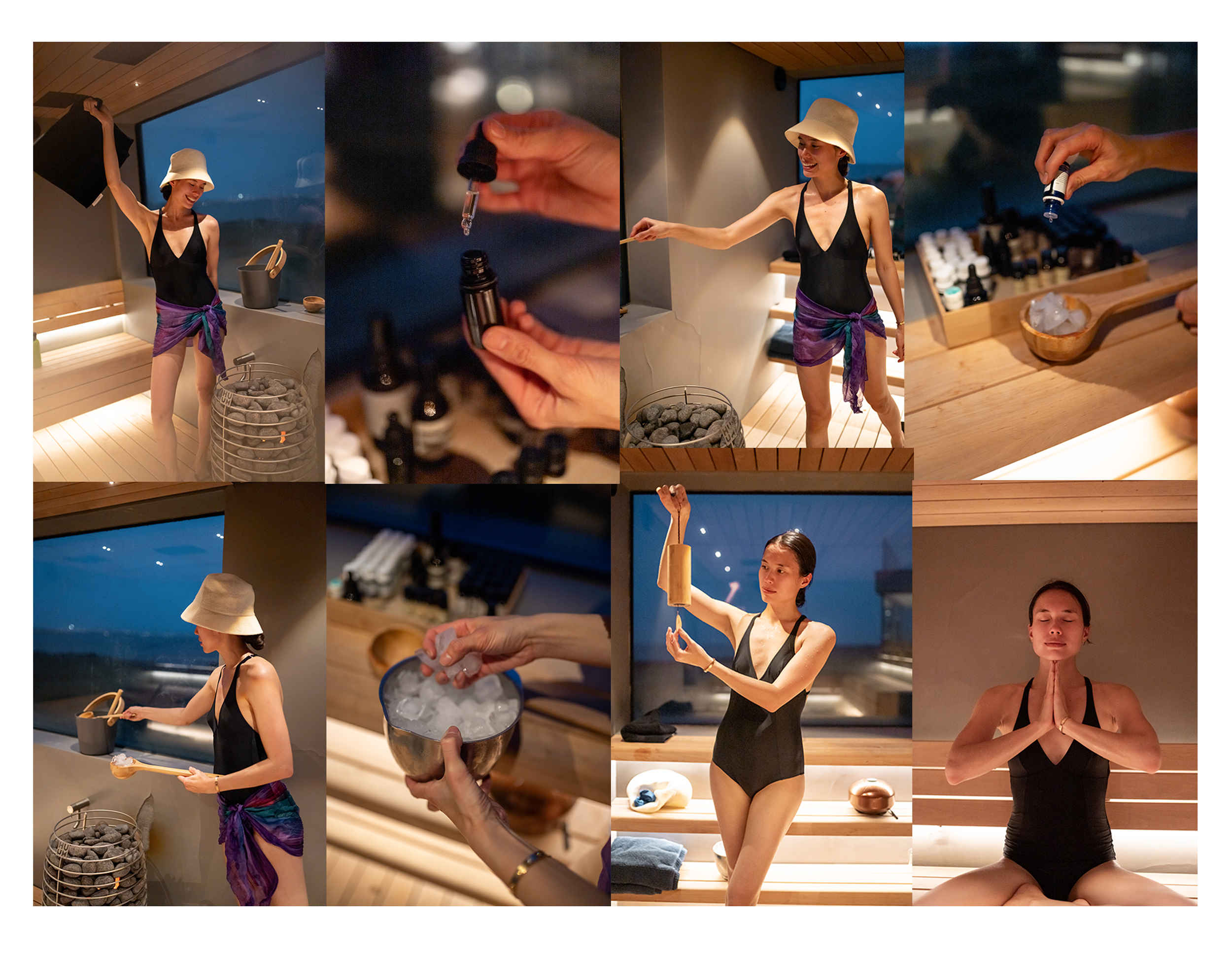Nourishing your body this winter w. Traditional Chinese Medicine
Unbroken line = Yang, Broken line = Yin
As winter blankets the world in its serene chill, the principles of Yin and Yang in Traditional Chinese Medicine (TCM) emerge as guiding lights for nurturing our well-being. In this season of rest and introspection, understanding the interplay of Yin and Yang and adapting our diet, rituals, and routines becomes pivotal for maintaining harmony within ourselves and with nature.
As I’ve been digging my head deep into Chinese ancient wisdom these days, I am exploring the beautiful, intricate & all-encompassing relationship of Yin and Yang, the fundamental philosophy developed in 3000 BC under Emperor Fu Xi (a true legend in mythology). We may know Yin and Yang as a symbol of balance but it’s essence is sooo much more than that. We can build a mindful, trusting way of life upon the principles of a Yin and Yang that is in constant search of in harmony with one another. Just like we are.. :)
Here I will go a bit deeper into how the Yin and Yang elements change during the winter and why we need to care about the way we compose our diet, sleep routine as well as heat, exercise, toxin release and gentle stimulation and activation of our Qi.
Yin and Yang is the single most important and distinctive theory of Chinese Medicine, representing an interchangeably and dependant relationship that is central to TCM. Yin and Yang symbolize the dualistic forces inherent in everything, representing the balance of opposing but complementary energies. Yin embodies qualities of darkness, coldness, and stillness, while Yang represents brightness, warmth, and activity. Winter, which is predominantly resting in Yin, will have you embrace these qualities by adjusting our lifestyle to support this inherent energy shift.
Commons problems during winter: Whilst I can’t speak for everyone, as the way our elements manifest and balance in our bodies, and our reaction to shifts in Yin and Yang energies are so wildly different, I will mention a few! Our skin, hormones, energy levels and cognitive performance are prone to change (particularly relevant for women), following cold hands and feet which I always tend to deal with.
Qi obstruction and poor blood circulation are some of the root causes of the physical changes we see and feel, which is why we have to focus on preserving Qi, and stimulating it kindly with the right supportive foods and activities.
For women who want to warm and nourish their bodies whilst attaining a collagen boast please see my recipe for Chinese beauty soup!, It incorporates many TCM herbs and restores immunity, detoxing, boosting Qi and balancing our complex hormones.
Adaptations in diet:
In TCM, winter calls for nourishing Yin and preserving Yang energies. Warm, cooked, and nourishing foods are recommended to bolster the body against the cold and maintain balance. Foods such as root vegetables, grains, soups, and stews are favored for their ability to provide sustained energy and warmth while supporting the body's internal balance. Other foods include: Lamb, beef (particularly the cuts w. a good amount of bone, joints that go into a scrumptious broth! Goji berries are among my favourite also for balancing our energy levels. Others include: Garlic, ginger, onion, white pepper which all have stimulating properties for our Qi that can become more stagnant in wintertime.
Herbal teas infused with warming spices like fennel seed ginger, cinnamon, and cloves can aid in improving circulation, digestion and nurturing the body from within. These nourishing beverages not only provide warmth but also help in maintaining the body's equilibrium during the colder months.
Isabella’s tip: One of my hacks is to buy cheap cuts such as oxtails, chicken fingers and fish heads and slow-cook (separately ofc) for most of the day and use that as a base for broths, soups & sauces to stew veggies and tofu. You won’t get a more nutritious, collagen-rich soup than that!
Adaptations in Sleep and Rest:
During the winter months, TCM encourages us to preserve our energy and to sleep as much as we possibly can; from sunset till sunrise. This becomes a bit of a challenge for all us busy bees.. and impossible if you live anywhere in Northern Europe… In Iceland that would mean I should sleep from 4pm till 10.30am at the time that I am writing this entry… But we get the message! Get in your much needed rest. Our bodies aren’t acquainted to thrive without sun, and as our bodies are clinging on to the duvet during those cold winter mornings, listen to what it tells you about snoozing early so that morning process becomes a little easier.
Adaptation in Rituals and physical activity:
Those who know me, like to call me a huge sauna-enthusiast and historically in TCM, regular sauna visits are great for ridding excess dampness and toxins from our bodies (read more on dampness if you’re interested), but a few examples of dampness are eczema and phlegm, which occur more commonly during the winter months. These can be relieved and prevented by regular sauna sessions, accompanied by essential oils (w. light stimulating properties), providing an aromatherapy session for improving the immune system, Qi and blood circulation, release stress, clearing pores and giving a beautiful skin appearance. A separate entry on Saunagus and aromatherapy will follow!
Some of the foods I’ve been consuming recently include my beauty soup, digestive herbal tea, oxtail soup, chicken soup w. daikon & shiitake, chicken congee w. winter melon, salt-cured air-dried spareribs & Mongolian lamb dumplings
Meditative sauna ritual using a blend of my essential oils, that is a spirit and body saver during these dark and cold winter months.
I’m excited to be sharing more of the benefits of each plant, as well as how towelling and ice-baths strengthen our immune system!


